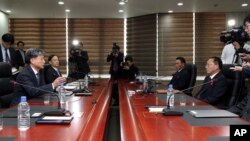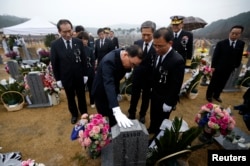This month North and South Korea held two days of high-level talks aimed at again reopening communications and building confidence, but they fell apart without any deal.
Critics say that shows the conservative government of South Korean President Park Geun-hye is actually not interested in pursuing peace negotiations and compromise with a partner that has let them down so many times before.
Seoul entered the December 11 talks hoping to work out an agreement to hold regular reunions for the estimated 60,000 Korean families that were forced apart by the division of the country 70 years ago.
In September, Pyongyang cooperated with Seoul to host reunions for separated families. Seoul wanted to have more regular reunions.
Pyongyang apparently wanted Seoul to reopen a cross border tourism program to the Mt. Kumgang resort that would bring in millions of dollars. Seoul had suspended the tours after South Korean tourist Park Wang-ja was shot and killed by a North Korean soldier.
Failure to compromise
During the talks, the North Korean side reportedly demanded that the tourism program restart before any other issue could be discussed.
Seoul’s Unification Ministry spokeswoman Park Soo-jin said tourist safety and financial security for investors were the overriding issues that prompted the South to reject the North’s demand.
“Our government’s position on the tour is that a system which secures safety for our citizens must be established first, and our companies’ property rights must be secured as well,” said Park Soo-jin
However the North Korean state run website Uriminzokkiri rejected that reason, saying the North had already offered the maximum protection for tourists when the countries considered restarting the program in 2009.
Business deals support Kim regime?
South Korea’s Foreign Ministry offered a second reason for the breakdown, saying there are concerns that the tours might violate U.N. sanctions that prohibit transfers of “bulk cash” to North Korea that could be used to fund its nuclear weapons program.
“Our government’s position is that it is necessary to consider the purpose of the U.N. resolution and concerns of the international community,” said South Korean Foreign Ministry spokesman Cho June-Hyuck.
Some Korean analysts say that argument appears disingenuous because Seoul typically supports economic engagement when companies in the South stand to benefit.
Seoul already cooperates with Pyongyang to operate the Kaesong Industrial Complex, where South Korean companies employ North Korean workers. Those wages are reportedly paid directly to the state and workers receive only a small portion of their earnings.
High bar for compromise
The more likely explanation for the failure of the talks, say several analysts, is the South's demand that the North apologize for the 2010 sinking of the Cheonan warship that killed 46 sailors and the shelling of a South Korean naval base on Yeonpyeong island.
North Korea has always denied it was involved in those incidents and analyst Ahn Chan-il with the World Institute for North Korean Studies said Park has long insisted that must change before sanctions can be lifted.
“South Korea needs to get apologies from North Korea for the sinking of the Cheonan vessel and the attack on Yeonpyeong island,” said Chan-il.
North Korea scholar Andrei Lankov at Kookmin University in Seoul said that is a demand the South knows the North will not accept.
“They (North Korea) also understand that if they admit their responsibilities, they’re not going to be rewarded. Because there will be a public outcry,” Lankov said.
Talks to please China?
One reason the South may have entered into talks it knew would go nowhere would be to curry favor with Beijing. China supports increased diplomacy to convince North Korea to give up its nuclear weapons for aid and support.
That may have led the South to at least sit down at the negotiating table. But Lankov said that Park’s conservative government remains convinced North Korea is an economic burden that cannot be trusted and offers little of value in return.
“Indeed it’s never reciprocity based on equal exchange. South Korea is always giving. North Korea is always getting something,” he said.
While Seoul says it is still committed to working towards peaceful reunification by developing inter-Korean relations, no future meetings have been scheduled.
Planning any talks in the next few months will be complicated by the annual U.S.-South Korean joint military exercises soon to begin, and the upcoming South Korean legislative elections.
Youmi Kim in Seoul contributed to this report.














